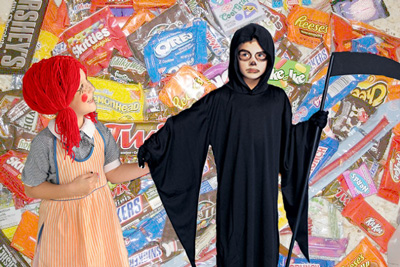On our last visit to Dr. Greenspan — a world-famous psychiatrist in the field of developmental disabilities — we were feeling especially discouraged. “How do you know Samantha’s not autistic?” I had challenged him. “Most of her other doctors and therapists seem to think she is. She has enough symptoms: repetitive language, limited eye contact and social skills, rigidity, meltdowns —”
“She’s not autistic,” he interrupted, leaning forward in his battered chair. “She’s too warmly related. You can see how she wants to connect. Look at her smile; notice how affectionate she is with people, not just with you, but also with her brother and some of her peers at school.”
“Then what do all of her symptoms mean?” Howard repeated my question. “A friend of mine who works with deaf people told me if a deaf child breaks a window or throws a tantrum, it’s not because he’s autistic or emotionally disturbed — another label we’ve been given. It’s because the kid has trouble communicating and is frustrated. Is that how Samantha feels?”
“Possibly, but there’s more to it. You have to look beyond just the symptoms,” Dr. Greenspan explained. “A person with a bad cough and breathing difficulties could have a cold or pneumonia or even lung cancer. The correct diagnosis is not always obvious. Right now the autism diagnosis is too broad and is in the process of being changed.”
“So what’s your diagnosis of Samantha?” I asked.
“Regulatory disorder with the core issue as speech and language. It’s like Howard’s analogy to deaf people who are frustrated by their communication problems and then act out. For Samantha her inability to use words to communicate causes her to lose control. Also her delayed motor skills are frustrating her developmentally appropriate desire to dress herself and do the things she sees her brother doing.”
This explanation was comforting. While I was grateful for all the gains Samantha was making at school, like developing empathy for classmates who were sad and broadening her interests to include music and even doing rudimentary addition, she usually came home and reverted to a hellion. It was almost as though she had used up all her mental and emotional energy to stay focused and controlled at school. She was trying so hard to hold a pencil, remember to go to the bathroom in time, be flexible about changes in schedules, or accept help from a teacher without melting down that the floodgates of emotion opened when she got home.
Our post-Halloween dinner was the usual nightmare. If the plate of food or glass was not set down on the table in front of her exactly as she wanted it, she exploded.
“I don’t want it like that! I want it here.” Samantha tried to grab the plate.
“You’ll burn yourself,” I explained. “Point to where you want it —”
She grabbed the plate and slammed it down on her placemat so hard the fish sticks bounced off her plate.
“Why does she always have to be like this?” Matt was eating his food so fast I was afraid he might choke.
“I don’t really know. Maybe it’s because she feels things are out of her control and that scares her and makes her angry. If she can control where her plate goes and put it in exactly the same place, it makes her feel better. Her brain doesn’t work quite the way yours and mine does.”
“Will she always be this way?” Matt gulped down the last of his milk. I could see he wanted to bolt from the table.
“I hope not. That’s why she’s going to a special school, where they have teachers and therapists to help her. That’s why she sees Barbara and Dr. Greenspan. I’m trying to help her be more like you and your friends, but it’s probably going to take a long time.”
“Well, it seems to me like she’s getting worse.” He wiped his milk mustache with his hands and rose from the table. “May I be excused?”
“Sure.” I sat and watched Samantha devour her Granny Smith apple as if it was the last piece of fruit on the planet. Perhaps it was a good sign that she enjoyed her apple almost as much as the Halloween candy. Every day she ate two green apples, one at lunch and one at dinner, all the way down to the core. As with everything else in her life, Samantha always pursued a hellish extreme, whether it was barging into a neighbor’s apartment to caress a baby or consuming an apple beyond the point most people would dare. Somehow she managed to savor the sweetness down to the last bite without choking on the pits.
“Halloween Hell” is an excerpt from the memoir, Family Pictures.



Loved the piece. If you have not done so already, I urge you to read “Shine Shine Shine” by Lydia Netzer. Given the opportunity to go through it all again, I think you would decline because you have grown through those years and have developed the ability (which I am trying to develop now) to say, “That was an accomplishment, and now it’s time for all of us to move forward.” For me, easier said than done (so far).